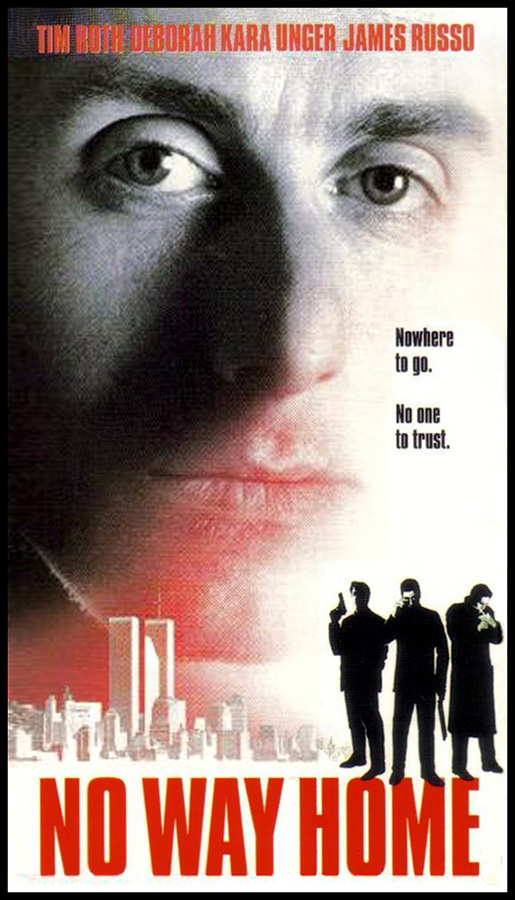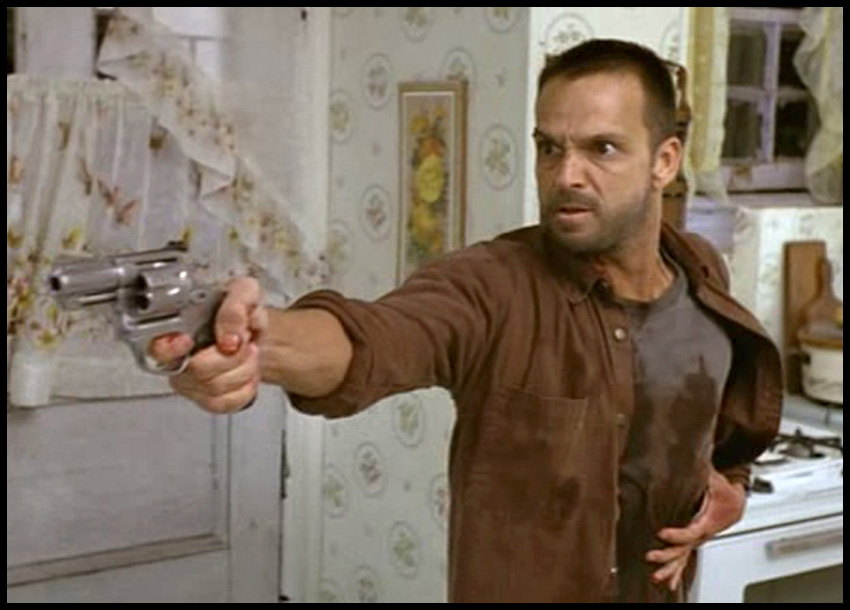|
NO WAY HOME (1996).
 Buddy Giovinazzo's feature debut, COMBAT SHOCK, proved he was capable of making a shocking, no-budget drama. His long-overdue sophomore effort accomplishes that same goal, while bringing more complex human dimensions to a similarly dysfunctional, skid-row landscape. Filmed under the title GASOLINE ALLEY (which was changed due to copyright problems involving the classic comic strip), this streetwise ode to brotherly love -- and the consequences of abusing that trust -- and plays like a Mike Leigh film crossed with TAXI DRIVER... Released from prison after serving six years for murder, Joey (Tim Roth) returns to his Staten Island neighborhood and older brother Tommy (James Russo). Still living in their family home, Tommy invites him to stay, though wife Lorraine (Deborah Unger) is reluctant, since money is tight. Slow-witted but thoughtful, Joey looks for an honest job and explores his long lost past -- as Lorraine worries that her husband's drug dealing will send Joey back to prison if his parole officer shows up. Paying no heed, Tommy continues to get his brother into trouble, even as he blows off long-overdue debts to local loan shark Scolaro. While escorting Lorraine to one of her stripping gigs, she asks Joey what caused him to murder a store owner during a botched robbery. Though he doesn't admit the truth to her, in flashbacks, we learn that Tommy was actually responsible for the cold-blooded crime that sent Joey to prison... Although the film is punctuated by sudden moments of harsh violence and bloodshed -- particularly during the climax,
Buddy Giovinazzo's feature debut, COMBAT SHOCK, proved he was capable of making a shocking, no-budget drama. His long-overdue sophomore effort accomplishes that same goal, while bringing more complex human dimensions to a similarly dysfunctional, skid-row landscape. Filmed under the title GASOLINE ALLEY (which was changed due to copyright problems involving the classic comic strip), this streetwise ode to brotherly love -- and the consequences of abusing that trust -- and plays like a Mike Leigh film crossed with TAXI DRIVER... Released from prison after serving six years for murder, Joey (Tim Roth) returns to his Staten Island neighborhood and older brother Tommy (James Russo). Still living in their family home, Tommy invites him to stay, though wife Lorraine (Deborah Unger) is reluctant, since money is tight. Slow-witted but thoughtful, Joey looks for an honest job and explores his long lost past -- as Lorraine worries that her husband's drug dealing will send Joey back to prison if his parole officer shows up. Paying no heed, Tommy continues to get his brother into trouble, even as he blows off long-overdue debts to local loan shark Scolaro. While escorting Lorraine to one of her stripping gigs, she asks Joey what caused him to murder a store owner during a botched robbery. Though he doesn't admit the truth to her, in flashbacks, we learn that Tommy was actually responsible for the cold-blooded crime that sent Joey to prison... Although the film is punctuated by sudden moments of harsh violence and bloodshed -- particularly during the climax,  as Scolaro's thugs pay a visit to their home -- writer-director Giovinazzo never allows them to overwhelm the more intimate aspects of its character-driven story or his quiet understanding of these battered souls. This film also benefits immeasurably from its trio of achingly-true performances. Russo plays a scene-stealing bastard, so blissfully self-destructive that he ignores the toll his actions take on those around him; while Roth is uncommonly reserved, and brings a weary sensitivity and regret to his role. Unger's long-suffering wife is the most complex of the lot, as she struggles with uncontrollable forces and family secrets. Further realism can be found in the outstanding production design, which finds urban locales as weathered as its characters. Steeped in emotional and physical brutality, and offering no easy answers, NO WAY HOME is an unflinching portrait of family ties at their most corrosive. as Scolaro's thugs pay a visit to their home -- writer-director Giovinazzo never allows them to overwhelm the more intimate aspects of its character-driven story or his quiet understanding of these battered souls. This film also benefits immeasurably from its trio of achingly-true performances. Russo plays a scene-stealing bastard, so blissfully self-destructive that he ignores the toll his actions take on those around him; while Roth is uncommonly reserved, and brings a weary sensitivity and regret to his role. Unger's long-suffering wife is the most complex of the lot, as she struggles with uncontrollable forces and family secrets. Further realism can be found in the outstanding production design, which finds urban locales as weathered as its characters. Steeped in emotional and physical brutality, and offering no easy answers, NO WAY HOME is an unflinching portrait of family ties at their most corrosive.
© 1997 by Steven Puchalski.

|